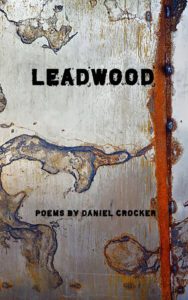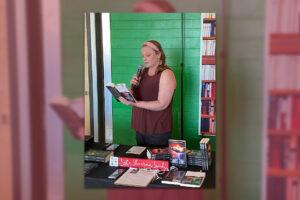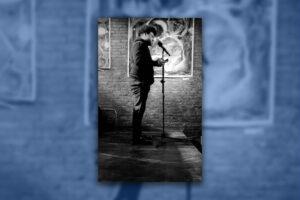“…when I decided to start letting a little humor into my poems, a whole new world opened up for me.”
Q. Can you talk about the process of compiling a collection of your work spanning over twenty years? What challenges did you run into?
It wasn’t easy to put myself in the headspace that I was in 20 years ago. I was undiagnosed bipolar 1 at that time and was probably more hypomanic than not (it would be some time before I had my first full-blown mania). So, I would get manic and try to write these epic poems. My style has changed so much since then. Still, I wanted to keep the integrity of the poems as I envisioned them when I was 19 or 20, for better or worse. I was so brutally open in so many of those poems. They’re very emotional and it was emotional for me to go back through them and relive some of the stuff like the death of my brother.
Q. I absolutely love your older poems, especially “Sorry Richie,” can you talk about how you now tackle similar subject matter with almost dark humor? (Because your style has changed significantly over the years)
I was 13 when my brother Richie died in a car accident. To say I didn’t handle it well would be an understatement. Most of that was because it was my first experience with death, I really looked up to and was close with Richie, and part of the difficulty processing the loss of my brother probably has to do with my mood disorder as well. I was incredibly sincere in those poems. It was tough on my anxiety. But, I had always been kind of funny. So when I decided to start letting a little humor into my poems, a whole new world opened up for me. As far as the type of humor, I guess dark is just what come naturally to me.
 Q. I love the ordering, can you talk about why you mixed up the order and why you chose not to do it chronologically?
Q. I love the ordering, can you talk about why you mixed up the order and why you chose not to do it chronologically?
The first time I ever tried to get a book like this together, I was in mania and it was a mess. I didn’t try again for another year. I’m not naturally gifted at ordering. It takes me a lot of different goes at it before it feels right. This book was different though. I was having my usual trouble ordering until I decided I’d name the book “Leadwood.” Then the ordering just came naturally. I’d start with stuff about my hometown, for example. Then get into what my hometown can do to people. From there, it felt right to me to go with poems about Margaret and the kids, my mental health, etc.
Q. I have known you as a poet, as a friend, for decades, you are one of my favorite writers, you tackle real subjects in a way that is relatable- can you talk about what is the most difficult subject that you have written about is and why?
The two most difficult were writing about my brother in “Sorry, Richie” and the first time I wrote about being bisexual in a frank and open way. Sorry, because I still had so much anger. I was 13 when he died and 19 when I wrote the poem. There wasn’t much distance for me there. It was something I didn’t like to talk about, etc. Then I just sat down, probably drunk, and wrote that poems in one sitting. It just came out. Then, I was new to computers and didn’t save the file. So, I wrote it again that night. What I ended up with, is basically what’s in the book now—for better or worse.
Q. I love your last book because of the way you used the Sesame Street characters as an extended metaphor for different mental health issues, can you talk about this and about how people have reacted to the book?
There was such a great reaction to Shit House Rat I couldn’t believe it. I mean, it had been awhile since Like a Fish. But, I got several great reviews, sold some copies, and most importantly heard from other bipolar people about how much the book meant them. They appreciated the humor in it and I think they could relate to things like Big Bird being mania and Snuff depression and The Cookie Monster addiction and self-medication.
Q. What was it like working with this particular press?
An absolute pleasure. I probably drove my editor, Jeanette Powers, crazy with my this OCD punctuation thing I have. Plus, this book gave me a lot of anxiety from start to finish. She listened to me whine about that, too, and warmly encouraged me to keep going. I think that goes above and beyond the call of editorial duty.
Q. What projects are you currently working on?
It was such a big project getting Leadwood together that I’m not currently working on anything but a stray poem here and there. No big projects. On the horizon, in the far future, I’d like to do one more book of poetry to kind of round out a trilogy (in my mind at least) with Like a Fish and Shit House Rat. Then, I’d like to do a book on the small press scene of the 90s. Maybe one day a really funny and depressing memoir.
Q. Let’s talk about the 90s zine scene as we were both heavily influenced by that experience. How did the 90s zine scene influence you and your writing? How does it compare to the current writing scene?
We were all really depressed and super serious weren’t we? Sorry, what I meant to say was oh well, whatever, nevermind.
Q. So, we obviously co-edit Trailer Park Quartley together, can you talk about what it is like being on the other side of the submission process and how the experience has informed you as a writer?
I help with TPQ and I’m also the editor of Southeast Missouri State University’s journal The Cape Rock. I love that side of it. I feel good accepting poems, finding poems that really knock my socks off, etc. I would like to say to all aspiring writers out there though to never take a rejection too personally. It doesn’t mean your work is bad. It could be that the magazine already has more good poems than they know what to do with, or the editor is having a bad day, or it’s just not a fit. Keep on sending.
Q. What are you currently reading?
Student essays and submissions. I read mostly contemporary books of poetry over the summer though. I always hesitate to do the writers I recommend thing because I always forget people. I will say, you’re writing the best stuff of your life right now. Jenny Yang Cropp knocks my socks off. John Dorsey and Nathan Graziano are staples for me. Mike James has really been killing it, as has Jeanette Powers and David Taylor. I hoping for a new Steve Henn book in the near future. I’m really looking forward to James Brubaker’s new collection of stories—Black Magic Death Sphere (Science) Fictions. They are already pretty famous, but Tim Seibles and Laura Kasischke are two poets I love. I know I’m missing writers that I know and love. I hope they forgive me. For young writers, I would suggest reading a little less Bukowski and a little more Berryman and Gluck and Sexton and….
Daniel Crocker’s work has appeared in The Los Angeles Review, Hobart, Big Muddy, New World Writing, Stirring, Juked, The Chiron Review, The Mas Tequila Review, and over 100 others. His books include Like a Fish (full length) and The One Where I Ruin Your Childhood (e-chap with thousands of downloads) both from Sundress Publications. Green Bean Press published several of his books in the ’90s and early 2000s. These include People Everyday and Other Poems, Long Live the 2 of Spades, the novel The Cornstalk Man and the short story collection Do Not Look Directly Into Me. He has also published several chapbooks through various presses. His newest full-length collection of poetry, Shit House Rat, was published by Spartan Press in September of 2017. Stubborn Mule Press published Leadwood: New and Selected Poems—1998-2018 (available now on Amazon and Barnes & Noble) in October 2018. He was the first winner of the Gerald Locklin Prize in poetry. He is the editor of The Cape Rock (Southeast Missouri State University) and the co-editor of Trailer Park Quarterly. He’s also the host of the podcast, Sanesplaining, about poetry, mental illness, and nerd stuff. He is a bipolar, bisexual Gemini who lives, teaches and writes in Missouri





